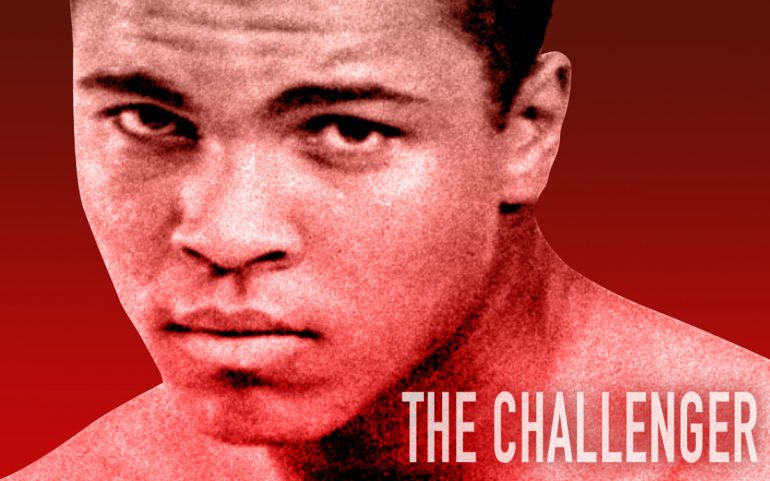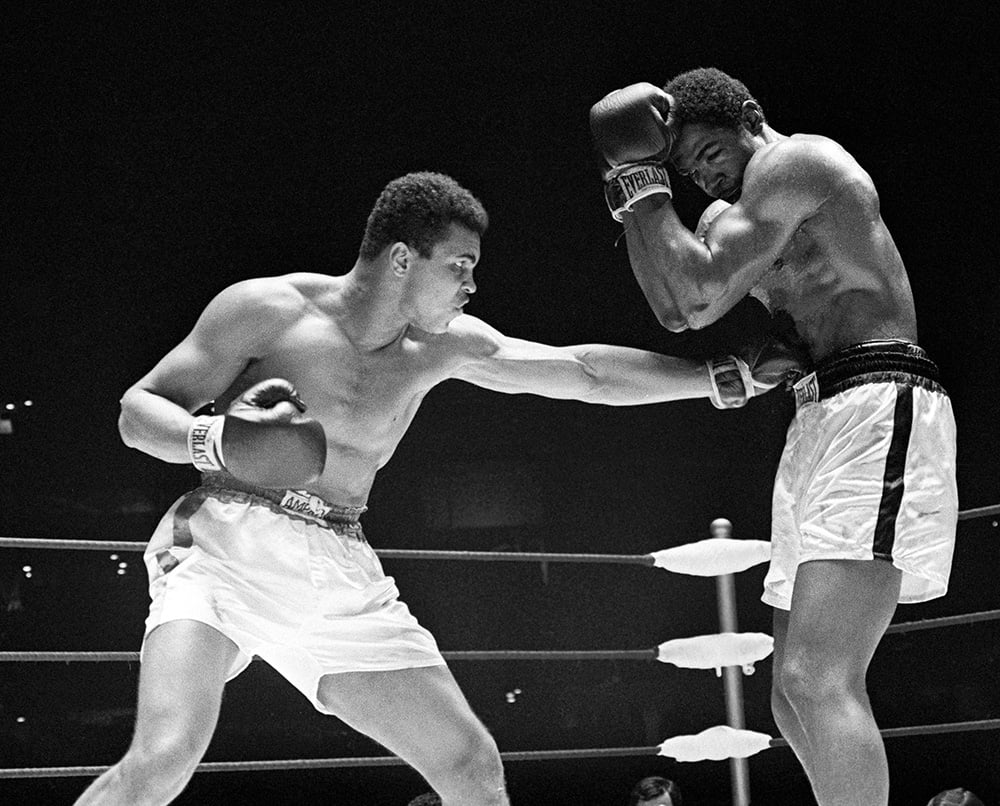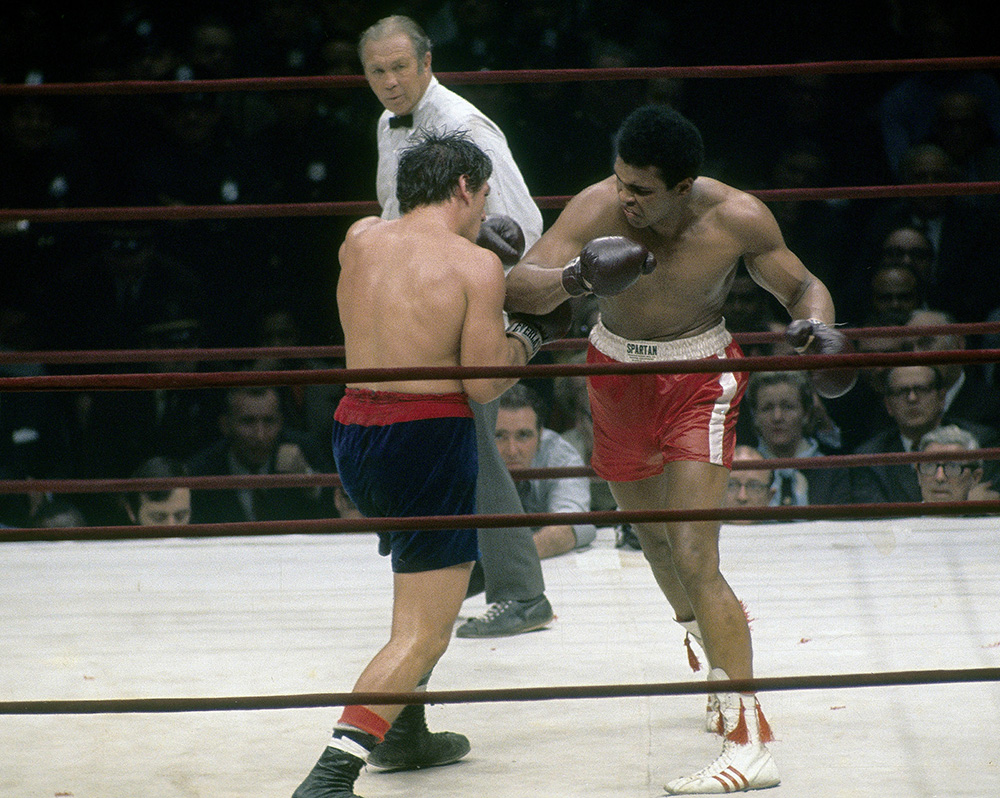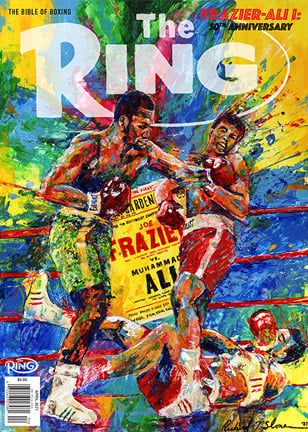
MUHAMMAD ALI
Record: 31-0 (25 KOs)
Age: 29 • Height: 6-foot-3
Reach: 78 inches
Stance: Orthodox
Official Weight: 215 pounds

 ALI vs. Doug Jones
ALI vs. Doug Jones
March 13, 1963 • Madison Square Garden, New York City
A 21-year-old Jones turned professional at middleweight in 1958 and developed into an excellent technician. The slick New Yorker won his first 19 bouts – scoring wins over former middleweight king Bobo Olson (KO 6) and 1952 Olympic champion Pete Rademacher (KO 5) – before dropping a decision to top heavyweight contender Eddie Machen (UD 10). Despite that setback, Jones was offered a vacant world title fight that would crown the successor to long-reigning light heavyweight champion Archie Moore. Jones dropped a 15-round unanimous decision to the excellent Harold Johnson in May 1962, and a third consecutive defeat, to Zora Folley, sent his career into a tailspin. Determined to bounce back, Jones stopped unbeaten prospect and future all-time great light heavyweight champ Bob Foster, then claimed revenge over Folley via seventh-round knockout. That victory set up a showdown with the emerging Cassius Clay. Riding a streak of 17 straight wins, 14 inside the distance (most of which he had predicted down to the round), Clay contemptuously viewed Jones as a stepping stone – an outlook that almost proved costly. The unbeaten phenom was shaken up by a right hand in Round 1 and tested throughout by Jones, who fought brilliantly. All sessions were competitive, but Clay closed the show with a furious burst in the 10th and final round to secure a points win. After changing his prediction during the buildup, Clay, as quoted by John Cottrell in a 1967 book entitled The Man of Destiny, said afterward, “I called it in six. Then I called it in four. Four and six, that’s 10, right?” The bout was named Ring Magazine Fight of the Year.
Result: Ali UD 10
 ALI vs. Sonny Liston
ALI vs. Sonny Liston
February 25, 1964 • Convention Center, Miami Beach, Florida
Charles “Sonny” Liston will always be a footnote in Ali’s career, but that does him a horrible disservice. The bone-crunching destroyer from Arkansas by way of St. Louis wiped out an entire division – defeating the likes of Nino Valdes, Cleveland Williams (twice), Eddie Machen and Zora Folley – before relieving Floyd Patterson of the heavyweight championship in just 126 seconds. A direct rematch lasted four seconds longer, and it was this destructive form that Liston carried into his second title defense. Following the Jones test, Clay had ventured to London to face Henry Cooper, and while the visitor won inside five rounds, as predicted, he was knocked off his feet by the popular Englishman with a left hook in the fourth. The prevailing thought was that if Cooper could knock Clay down, then Liston would put him six feet under. Things didn’t work out that way. The 22-year-old Clay came of age in Miami Beach, befuddling the monstrous champion with a quick jab, dazzling combination work and incredible foot speed. Other than in the fifth round, when the challenger was mysteriously blinded by a foreign substance, Liston struggled to score with any kind of consistency. When Clay’s eyes cleared, normal service resumed and a cut under Liston’s left eye worsened. At the end of Round 6, the champion informed his corner that he’d had enough, and a new era had begun. The initial story was that Liston had pulled his left shoulder out of the socket, and there are many who believe that he was ordered by the mafia to take a dive. However, isn’t it a strange coincidence that the winner of this fight would go on to establish himself as arguably the greatest heavyweight of all time? This bout was also named Ring Magazine Fight of the Year.
Result: Ali TKO 7
 ALI vs. Sonny Liston 2
ALI vs. Sonny Liston 2
May 25, 1965 • Central Maine Civic Center, Lewiston, Maine
He won the title as Cassius Clay, but he would defend it as Muhammad Ali. Two days after his shocking upset of Liston, the new champion confirmed his affiliation with the Nation of Islam, and the following month he was bestowed his Muslim name by leader and teacher Elijah Muhammad. With his metamorphosis as man and fighter complete, Ali got back down to business. The Liston rematch was originally scheduled for November 16, 1964, in Boston, but Ali suffered a hernia three days before the bout and required emergency surgery. He would be out of action for six months. Despite winning the first encounter, Ali was the underdog heading into the return match. The consensus was that Liston hadn’t prepared adequately and would right the wrongs emphatically in the sequel. But while the challenger had trained hard for the Boston bout, he was disheartened by the postponement and lacked motivation ahead of the new date. When the opening bell sounded, Liston looked slow and Ali was faster than ever. Midway through Round 1, the champion countered a ponderous left jab with a quick right-hand counter and Liston went down. The knockdown was legitimate, but it did not appear to be a fight-ending punch. Referee and former heavyweight champion Jersey Joe Walcott, apparently shocked by the turn of events, lost control of the action when Ali refused to go to a neutral corner. Liston rose and was immediately forced to cover up when Ali attacked with a flurry. However, timekeeper Francis McDonough and Ring Magazine founder Nat Fleischer signaled to Walcott that Liston had been counted out and Ali was awarded a first-round knockout win. The official time was 2:12. This was arguably the most controversial heavyweight championship fight of all time.
Result: Ali KO 1
 ALI vs. Ernie Terrell
ALI vs. Ernie Terrell
February 6, 1967 • Houston Astrodome, Houston
When Ali elected to give Sonny Liston a direct rematch, the WBA stripped him of its portion of the title. Yes, boxing has been punching itself in the face for a very long time. Terrell would pick up the then-lightly regarded WBA bauble by virtue of a 15-round decision over Eddie Machen in March 1965, and he made two successful defenses against George Chuvalo (UD 15) and Doug Jones (UD 15). However, the boxing world knew who the real champion was and Terrell yearned for recognition. The pair were originally scheduled to meet in early 1966, but Ali’s “I ain’t got no quarrel with them Vietcong” statement forced him to fight abroad for several months and the bout was postponed. The buildup was nasty, with Terrell refusing to acknowledge the champion’s Muslim name and Ali labelling his rival an “Uncle Tom.” Ali also slapped Terrell across the face live on ABC television, and he vowed to punish and humiliate his opponent in the ring. That’s exactly what he did. Ali started fast, busting through Terrell’s guard with combinations before using his feet and reflexes to avoid return fire. As the rounds passed, the punishment intensified and so did the verbal taunting. The three-word question “What’s my name?,” which has become synonymous with Ali, was said over and over again and punctuated by blow upon blow. Terrell’s left eye was badly damaged and he ended the contest with an injury that required surgery. The 6-foot-6 Chicago resident claimed that he was thumbed in Round 2, but video evidence is inconclusive. Ali claimed a lopsided decision win, and as a result of him regaining the WBA belt, he was named “The Undisputed Heavyweight Champion of the World.” In truth, there never was a dispute.
Result: ALI UD 15
 ALI vs. Jerry Quarry
ALI vs. Jerry Quarry
October 26, 1970 • City Auditorium, Atlanta
Following several unsuccessful attempts to secure a boxing license, Ali finally saw light at the end of the tunnel when Georgia Senator Leroy Johnson committed to staging a bout between the former champion and Jerry Quarry. On September 2, 1970, an overweight Ali warmed up with eight exhibition rounds against prospects Rufus Brassell and George Hill at Morehouse College in Atlanta. His comeback opponent, however, was far from being a prospect. The October 1970 issue of Ring Magazine rated Quarry as the No. 1 heavyweight in the world, and the gutsy Californian held wins over Floyd Patterson, Thad Spencer and Buster Mathis. In 1969, Quarry was stopped by Joe Frazier (TKO 7) – in the Ring Fight of the Year – and he mistimed the referee’s count in an unfortunate loss to George Chuvalo (KO 7). However, a crushing sixth-round knockout triumph over previously unbeaten power-puncher Mac Foster had reignited his career. On paper, Ali was taking a huge risk in what was his first fight since knocking out Zora Folley (KO 7) over three-and-a-half years earlier. Despite being a non-title affair, the Ali-Quarry bout was a massive event that carried the majesty of a world championship fight, and it was scheduled for 15 rounds. A sleek 213½-pound version of Ali showed up on fight night and started fast, landing the jab at will and firing off some nice combinations. Despite spots of ring rust, Ali managed to time his man with a near-invisible right counter in the third round that produced a horrible gash over Quarry’s left eye. A follow-up burst of accurate rights worsened the damage, and the doctor stopped the fight at the end of the round. Ali was back, and the heavyweight division was put on notice.
Result: ALI TKO 3
 ALI vs. Oscar Bonavena
ALI vs. Oscar Bonavena
December 7, 1970 • Madison Square Garden, New York City
With the enormous financial success of the Ali-Quarry showdown, it was only a matter of time before the ex-champion was granted a license in other states, and New York was only too happy to get back in the Ali business. Having dealt with Quarry in short order, and with a superfight against Frazier pending, trainer Angelo Dundee was eager to see Ali tested physically. Argentine powerhouse Oscar Bonavena was one of the most durable and rugged heavyweights around. Nicknamed “Ringo” due to his Beatlesesque hairstyle, the barrel-chested Bonavena was the first man to knock Frazier off his feet, dropping the Philly warrior twice in a 1966 bout that Bonavena lost via 10-round split decision, and he was also gutsy in a rematch that went the full 15 rounds. Like Patterson and Terrell before him, Bonavena taunted Ali by calling him Clay, and there was genuine animosity during the buildup. Ali vowed to punish his opponent, but unlike the Patterson and Terrell massacres, this fight was anything but one-sided in his favor. Despite having had one comeback bout, Ali struggled to find a rhythm, and Bonavena’s unpredictable raids gave him hell. The former champ was ahead on points entering the 15th and final round, but the critics were sharpening their knives as the seconds ticked away on a disappointing performance. Midway through that session, however, Ali nailed Bonavena with a counter left hook that sent the Argentine sprawling to the canvas. Aided somewhat by referee Mark Conn, who failed to implement mandatory eight counts or send Ali to a neutral corner, “The Greatest” prevailed on the three-knockdown rule, becoming the first and only man to stop Bonavena. “It was the toughest fight I ever had,” said Ali afterward. The bout wouldn’t hold that distinction for long.
Result: ALI TKO 15

Tom Gray is Associate Editor for Ring Magazine. Follow @Tom_Gray_Boxing
MORE:
Cassius Clay vs. Sonny Liston and the fights that molded a champion
Muhammad Ali: Truly one of The Greatest

